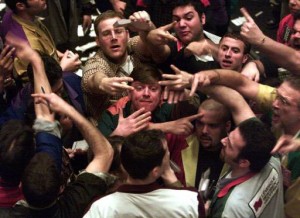What makes a market?
If there’s one thing that you can guarantee about the stock market, it’s that everyone has an opinion. At first blush, it seems fairly obvious that with so many different people participating in the market, there’s bound to be differences of opinion.
What many observers and inexperienced investors/traders don’t do, however, is to look deeper at what it is they’re actually saying by admitting that there are so many different opinions. By acknowledging the differences of opinion in the market, the most profound insight is that not everyone can be right at the same time. In other words, somebody has to be right and somebody has to be wrong. It is this very disagreement, in fact, that makes a market.
Two’s company but three’s a market?
So why is this seemingly trivial piece of information actually incredibly valuable? To understand why, we have to take a step back and understand first where a “market” comes from.
Simply put, a market arises because a buyer wants to buy something and a seller wants to sell something. Where they have to come to some agreement on is price. It is for that reason that markets are sometimes referred to as “price discovery mechanisms”. One of the favourite questions Sparx encourages beginner traders to ask is: “how much is something worth?” Think about that for just a moment. The answer is “whatever someone is willing to pay for it”. Without both a buyer AND a seller, there is NO market.
Markets are born out of disagreement; they are built on one party believing one thing and another believing the exact opposite. For this reason, buyers and sellers compete directly with one another in what some call a “zero-sum” game meaning that the “winner” wins at the expense of the “loser”. While this is mostly true, there are also slews of “middle men” or brokers that facilitate buyers and sellers’ transactions (more on that in another article).